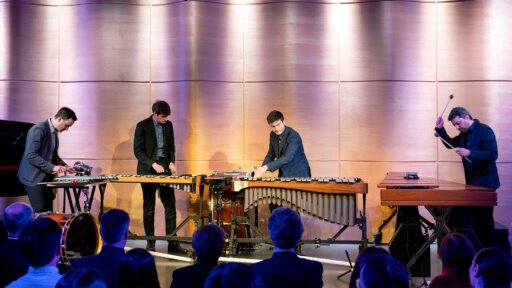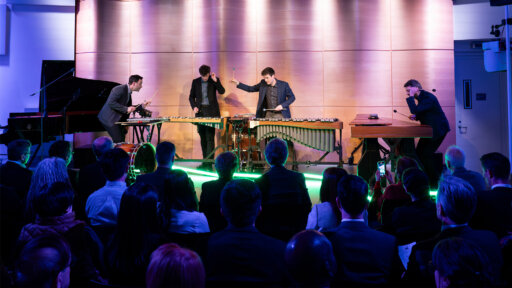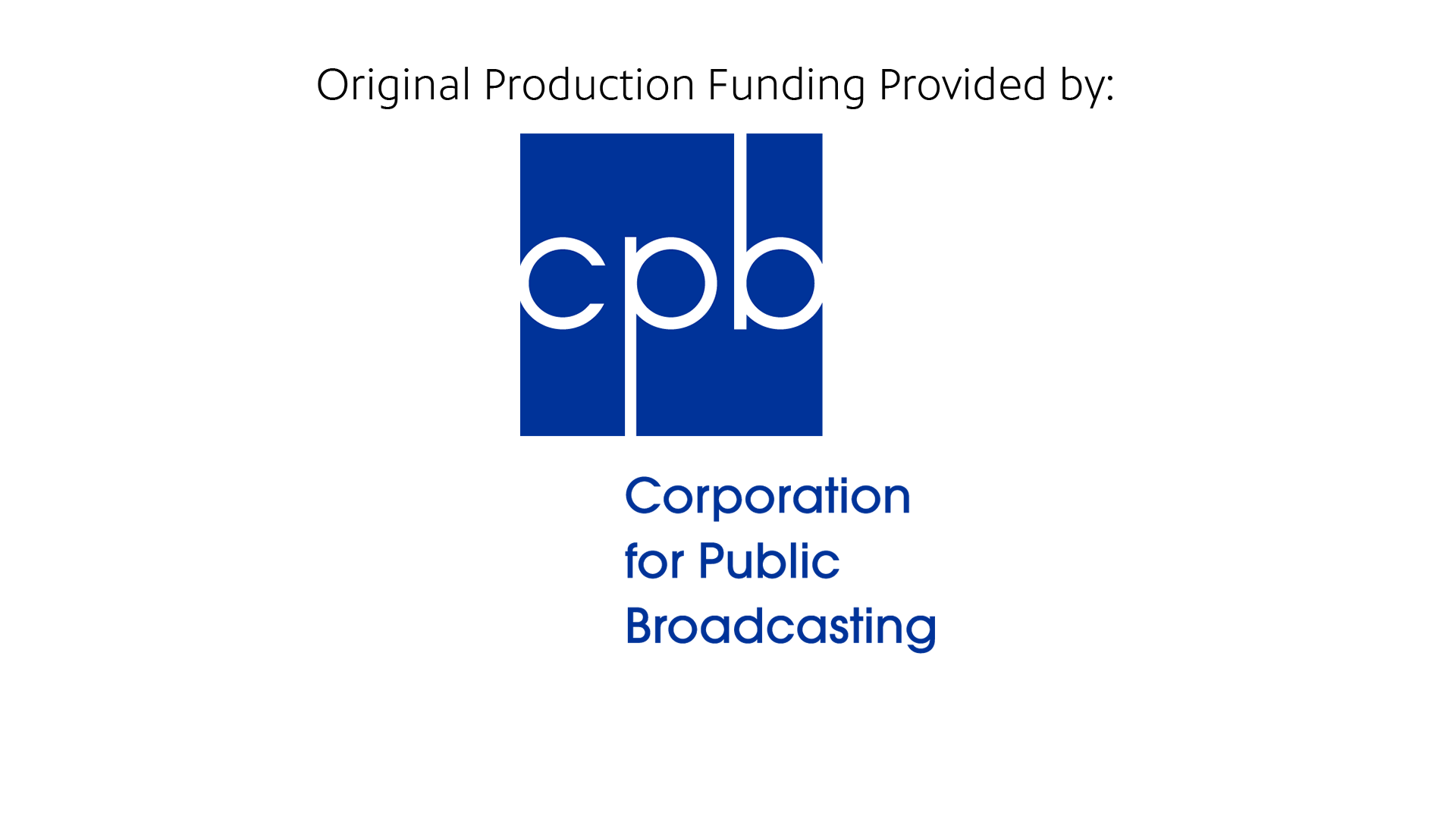TRANSCRIPT
So I received the news that we had won this Avery Fisher Career Grant, kind of in a strange way in that I got an email from someone that I didn't know, a really nice someone asking if I could give them my phone number because I think the way it was supposed to work was that somebody gave them my phone number, but they messed it up.
They gave one digit wrong and they had apparently been trying to reach us for a while and no one was calling back and they had to find out if we wanted to accept this award or not.
♪♪ All four of us, I think, started with the drum set from a pretty young age.
I think we all had perhaps aspirations of being in rock bands, you might say, and maybe we're living some alternate reality of that dream.
So, you know, growing up in America, listening to popular music, we — I think we're all really drawn to that instrument, the drum set.
And so for me, it was a that's the starting place.
And then when it's time to be in middle school band or high school band, you're of course in the percussion section, which is where we slowly start to learn a few of the other instruments.
♪♪ And Sandbox Percussion has been together for quite a while now.
We started in 2011 and it started pretty naturally actually.
We all met in grad school at the Yale School of Music, and when we were there playing percussion chamber music was a really big part of our curriculum.
When we were in school, we all loved playing percussion chamber music so much that we knew it it would become some part of our career after school.
I think we just got together once a month, maybe to do some rehearsals on the weekend, sort of started to build repertoire of pieces that were already written for percussion.
But then going forward, one of the big things that we really connected on was working with living composers and realizing new works for percussion and for percussion quartet.
Naming your ensemble is maybe the most difficult part.
But early on I remember we all had some common values about what we were doing and you know, a lot of the music we were playing was by American composers.
So we wanted an English word, you know, something that felt approachable and a little bit serious.
And when the word “sandbox” came up, I think it just stuck with all of us.
You know, in a way, it felt easy to understand and the real spirit behind the word is one of, you know, people coming together to play first and foremost.
But there's also a little bit of an air of like, You don't mess with a kid in the sandbox, you know.
Like that kid is making a castle, gosh darn it.
And that's kind of how we feel like we're, we're dead serious about having fun doing what we do.
We're going to be playing “Pillar V” by Andy Akiho at the Greene Space.
We're super excited for this piece because it is sort of a fiery piece, high energy, really fun to play.
With maybe some surprises as well for people who will be watching.
But it's actually a fun piece for us to play because it's incredibly rhythmic as well.
There's sort of this ostinato that is happening and two of the players.
It's an ostinato that you can tap your foot to, but it changes a little bit and it kind of like keeps us on our toes.
One of the most interesting things that we do is work with composers to figure out how to take objects or just things that we come across in our lives and turn them into instruments that can be as expressive as any other instrument that you might find on stage.
And we've been very fortunate to be working with these incredibly creative composers that can imagine beautiful sounds on things that if we glanced at them once, we might not have thought that was possible.
So just like one tiny little example in the piece we're going to play at this concert at the Greene Space, Pillar V, the composer Andy Akiho has written for some traditional mallet percussion instruments.
The vibraphone, the glockenspiel, things that you've seen in an orchestra before.
But he wanted something that was pitched but a little bit different than that.
And so we showed him this instrument that we had used before that essentially is just metal pipes, plumbing that you get at a hardware store.
We go to a Home Depot, buy a huge thing of plumbing.
We have a pipe cutter back at our studio and using math, we figure out how you have to cut that piece of plumbing so you can tune it to a C or a D or whatever note you're looking for, and you tune it, but you don't tune it perfectly.
So there's just a little bit of funkiness to the sound and when blended with a perfectly tuned vibraphone or something like that, it makes this otherworldly texture that we had never heard before.
♪♪ I think for me, that moment where we're workshopping something new with a composer is one of the most exciting things we get to do.
Oftentimes that score you're describing isn't finished.
It's not sealed and delivered yet.
They're coming to us with some ideas.
And usually we're trying to help them to turn those ideas into the most successful thing we can.
So we have our experience of playing these instruments and we want to help them turn their idea into into something that feels really good to play.
We happen to be the first percussion ensemble that has ever been awarded the Avery Fisher Career Grant, which is incredible to us Our whole — most of our mission is about trying to expand the reach of this music that we think is amazing and create opportunities for the folks who are coming after us.
We look up to groups that are a little bit older than us that have done things like this.
And for us to be able to participate in this way is a really special thing.
♪♪ ♪♪ ♪♪ ♪♪ ♪♪ ♪♪ ♪♪ ♪♪ ♪♪ ♪♪ ♪♪ ♪♪ ♪♪ ♪♪ ♪♪ ♪♪ ♪♪ ♪♪ ♪♪ ♪♪ ♪♪ ♪♪ ♪♪ ♪♪ ♪♪ ♪♪ ♪♪ ♪♪ ♪♪ ♪♪ ♪♪ ♪♪ ♪♪ ♪♪ ♪♪ ♪♪ ♪♪ ♪♪ ♪♪ ♪♪ ♪♪ ♪♪ ♪♪ ♪♪ ♪♪ ♪♪ ♪♪ ♪♪ ♪♪ ♪♪ ♪♪ ♪♪ ♪♪ ♪♪ ♪♪ ♪♪ ♪♪ ♪♪ ♪♪ ♪♪ Theres actually another percussion quartet, also from Brooklyn like us, called So Percussion.
And we like to say they kind of cut down the tall grass, you know.
Each generation it gets to be a little more “normal,” you know, quote unquote, to have a percussion quartet playing next to a string quartet or a piano trio, or something like that.



